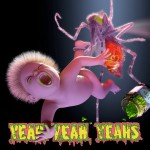For many, garish, displeasing and downright obnoxious may be the only words that come to mind when describing the Yeah Yeah Yeahs’ latest album cover for “Mosquito.” Simultaneously, however, those may also be the absolute last words that come to mind in describing the sounds of “Mosquito.”
Over the past decade or so, the Yeah Yeah Yeahs have succeeded in establishing a sound completely its own. Each album is a departure from the last, yet still is unmistakably the sound of the Yeah Yeah Yeahs’ raw post-punk, dance floor-friendliness. “Mosquito” proves no different this time around with its synthesizer experimentation, percussive sounds and ballads. Sure to be a music staple this season, the album offers something for both fans new and old.
“Mosquito” is the fourth full-length album by the Yeah Yeah Yeahs, a New York rock band, and features 11 songs. The album is comprised of several new elements such as unexpected artist collaborations with rapper Dr. Octagon and a gospel choir as well as productions by Nick Launay and LCD Soundsystem’s James Murphy. In doing so, the album represents the Yeah Yeah Yeahs’ greatest musical progression to date.
For those uncertain of the rock elements in the band’s latest tunes, songs like “These Paths” and “Sacrilege” confirm the Yeah Yeah Yeahs have left a large portion of their rock roots in the past.
“These Paths” highlights some of the band’s most experimental sounds through the use of synthesizers and odd percussion all throughout, whereas the single, “Sacrilege,” stays true to the band’s uncanny ability to produce a catchy tune with high-register, distorted vocals and the crescendo of a gospel choir.
The band’s experimentation doesn’t just stop there. “Area 52,” the only traditional rock song on the album, delves into science fiction (“I wanna be an alien/ take me”), and the dubby echoes and strong bass heard in “Under the Earth” were inspired by reggae. And while most collaborations seem to contribute positively, the electro-rock grooves of “Buried Alive” are injected with a rap verse by Dr. Octagon, catching listeners off-guard and leaving them to question the direction of this album.
However, the band sticks true to its roots with songs like “Wedding Song,” a ballad very reminiscent of the earlier song “Maps,” ultimately reminding old fans why they still love the Yeah Yeah Yeahs.
Amidst the majority of the edgy sounds that cover the record, the band slows it down with “Subway” which pays tribute to the calm and peaceful aspects of New York City through its mellow, soft vocals and “Always,” that features light, dreamy synths.
“Mosquito” not only represents a musical departure, but also a lyrical and emotional one. For the first time since 2011, “Mosquito” features songs reflecting upon lead singer Karen Orzolek’s marriage to director Barnaby Clay in 2011.
“Forget the time, forever mine” are the opening lyrics to “Always,” the first song on the album that focuses on the concept of marriage. And later, Orzolek bares all through her confessions made in the concluding song “Wedding Song” as she sings melodiously, “One thousand deaths my dear/ I’m dying without you here.”
It’s these songs that allow words like new, creative and experimental to pop into listeners’ heads as “Mosquito” does not fall short of the Yeah Yeah Yeahs’ continual progression and inventiveness.
